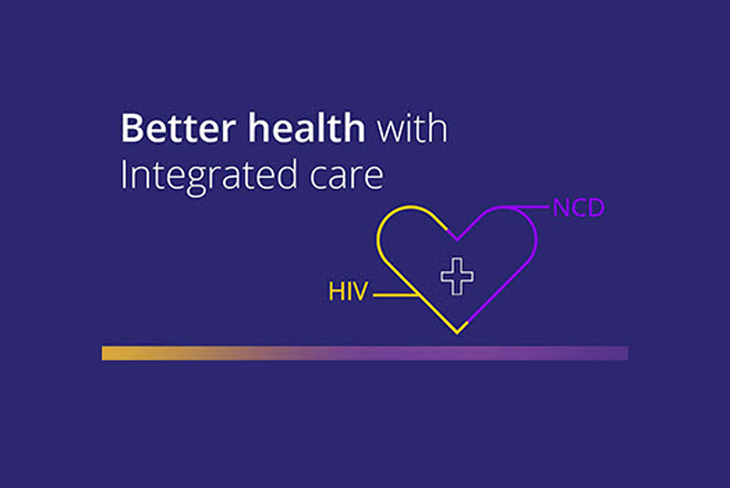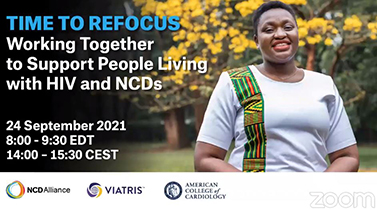Show Menu
Choose Your Location
You are now leaving the Viatris page for a Viatris affiliate site or third party site that is solely responsible for its content, including its compliance with guidelines applicable in certain geographies. Links to Viatris affiliate sites and third party sites are provided as a resource to our visitors and may not be governed by the same regulatory requirements applicable to this site and unaffiliated third party sites are subject to their own terms and data protection notices and practices. Moreover, if their third party site is subject to other country laws, regulatory requirements, data protection requirements or medical practices may differ between countries and the information provided therein may not be suitable for use in your country.

October 15, 2021
In one month, Charity Muturi lost four relatives to COVID-19 in her home country of Kenya. And like Muturi, who lives with a mental condition and takes care of family members living with chronic diseases, each of those relatives also lived with an underlying health condition, or noncommunicable disease (NCD), like diabetes or hypertension.
Amid the pandemic, the disparities in how infectious diseases and NCDs are treated, diagnosed and even prevented have taken on new importance as those with pre-existing conditions are most at risk for severe symptoms, hospitalization and death from COVID-19. Muturi and other healthcare stakeholders gathered at the UN General Assembly in September for a panel discussion about the need to integrate care for those living with NCDs and infectious diseases, in particular HIV.
“When health and social protection systems fail, we pay with our lives,” said Muturi, a member of the Our Views, Our Voices Advisory Committee in Kenya who advocates for integration of services and ensuring patients have a voice in healthcare decision-making.

The online panel, co-hosted by the American College of Cardiology, Viatris and the NCD Alliance, explored what is needed to make integrated NCD and HIV services a reality, share best practices, and discuss the roles of different stakeholders in ensuring successful roll-out. This panel was inspired by the United Nations High-Level Meeting on HIV/AIDS in June 2021, and the political declaration from that meeting which calls for better alignment in the health systems that support people living with HIV and NCDs.
“COVID-19 has shaken the foundations of health systems and economies everywhere. People living with NCDs have been at the epicenter of this crisis in all countries and specifically low- and middle-income countries,” said Dr. Liesl Zuhlke, a pediatric cardiologist in South Africa and NCD Alliance board member. “If we want to build back better from this pandemic then we have to invest in a more integrative approach to ensure that our health systems are fairer and fit for the future.”
‘People Don’t Live in Silos’
NCDs include the world’s leading causes of death, such as heart disease, stroke, diabetes, respiratory diseases and cancer. NCDs pose a threat that is compounded and amplified by infectious diseases, including HIV/AIDS, tuberculosis, malaria and now, COVID-19.

NCDs often share common risk factors with infectious diseases like HIV, the care of which has dramatically advanced in the past two decades. Those advancements were supported by the U.S. President's Emergency Plan for AIDS Relief (PEPFAR), which is the largest commitment by any nation to address a single disease in history. The success of PEPFAR and efforts to control the HIV epidemic has required integration with host country health systems and scaling and simplified delivery approaches, said Dr. Robert Ferris, Chief, Division of Technical Leadership & Research in the Office of HIV/AIDS, U.S. Agency for International Development.
Building on that success, stakeholders in healthcare need to break down the silos between the treatment of NCDs and infectious diseases and take a more patient-centered, holistic approach to care, the experts said.
“People don’t live in silos,” Dr. Zuhlke said.
Dr. Ren Minghui, assistant director general for Communicable Diseases at the World Health Organization, said the burden of NCDs has changed the world over the past 20 years. It’s caused a shift in the way they work at WHO, with disease programs increasingly collaborating toward shared goals, he said.
“Integrated services improve access and breakdown barriers of discrimination associated with a vertical approach,” Dr. Minghui said. “COVID-19 recovery is an opportunity for us toward universal health coverage.”
The Role of Viatris in Integrating NCD Care
Dr. Lobna Salem, Viatris’ Regional Chief Medical Officer, Developed Markets, Japan & Australia, noted during the panel that the private sector is an important stakeholder in the care conversation. She said Viatris is uniquely positioned given its commitment to both NCDs and HIV to rally the healthcare community behind better understanding and integration of care and using the evolution of HIV treatment as a good example of what can be done and understanding what needs to be further accomplished to tackle both. Viatris’ success in expanding access over the past 10-plus years to innovative HIV drugs, particularly in low- and middle-income countries, was recognized this year by Fortune, which named the company 5th on its Change the World List.

“No one stakeholder can do it alone and integration of care benefits the patients and healthcare systems alike,” Dr. Salem said.
At Viatris, this includes supporting the development of a research paper in partnership with the NCD Alliance that will provide scientific evidence, and identify gaps and potential solutions for integrated care of HIV and NCDs.
It has also meant examining the relationship between NCDs and other infectious diseases such as COVID-19, and supporting educational initiatives like the NCD Academy platform to educate healthcare workers about NCDs and their effective management.
Taking a People-centered, Multi-stakeholder Approach
Integrating care through a people-centered, multi-stakeholder approach can have far reaching benefits, including increased access to specialized care and better detection and treatment, Dr. Zuhlke said. In Malawi, for example, the country’s National Cancer Program manager for the Ministry of Health Dr. Jonathan Chiwanda detailed how HIV clinics are partnering with other groups to offer patients screenings for cervical cancer, hypertension and other conditions.
Dr. Dipti Itchhaporia, president of the American College of Cardiology, said integrating care can also help address cardiovascular disease, an NCD that accounts for 32% of deaths worldwide. Identifying those at high risk for cardiovascular disease and stroke – and that includes people living with HIV and AIDS – will help ensure they receive appropriate treatment and prevent premature deaths, she said.
“As a cardiologist, I know that the inflammatory response associated with HIV and AIDS puts individuals at greater risk of dying from cardiovascular disease… We know that identifying those at highest risk for CVD and ensuring that they receive appropriate treatment can prevent premature deaths,” Dr. Itchhaporia said.
Some keys to integrating care is to train all primary care physicians in recognizing the most common NCDs and taking advantage of technological advances that have been propelled by the pandemic.
“Technology and digital transformation of healthcare offers the single greatest opportunity to transform the future of healthcare delivery in both developed and developing countries,” Dr. Itchhaporia said. “If we remain laser focused on building digital platforms for delivering high-quality low-cost personalized care, we can build a healthcare future that enhances – not exacerbates – our ability to provide equitable care regardless of their geography or their income status.”